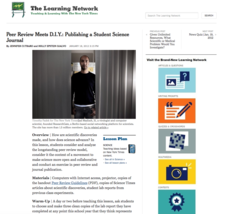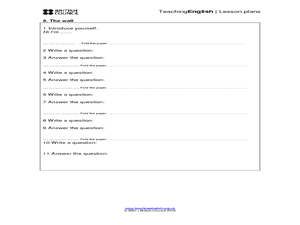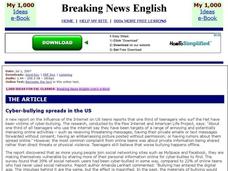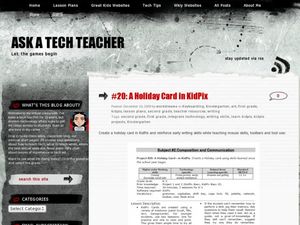Curated OER
Cave Painting in the Ice Age
Students take notes and sketch during the Internet research. They take notes of the colors found in the cave paintings (black, browns, ochre, sienna). They create an initial full size comprehensive sketch on scrap paper and in their...
Curated OER
Jewel of the Mississippi Delta
Students develop their own website to show the information they gathered about the Mound Bayou on the Mississippi Delta. After taking a field trip to the area, they create their own coloring books, stories and games to share the history...
Curated OER
Life as a Legend: Marilyn Monroe: What is Beautiful?
Students consider the notion of beauty and what impact the media and popular culture have on it. In this cross curricular lesson, students examine print ads, write down and share their thoughts on them. Then students form literary groups...
Curated OER
Peer Review Meets D.I.Y.: Publishing a Student Science Journal
Peer review of science laboratory reports? You bet! First, learners work in pairs to review a scientific article. Then they trade lab reports for peer review. The end result is the publication of a classroom scientific journal!
Curated OER
Facebook Worksheets
In this friends worksheet, students read a text, fill out a profile, fill in the blanks to short sentences, and more. Students complete 5 activities.
Curated OER
Who is the Expert? Exploring Credible Sources in Healthcare
How do you decide what sources are credible when researching online? Evaluate sources with a focus on researching health issues. After brainstorming common health concerns and how they would try to diagnose these problems, class members...
Curated OER
Breaking News English: Online Bullying
In this online bullying worksheet, students read the article, answer true and false questions, complete synonym matching, complete phrase matching, complete a gap fill, answer short answer questions, answer discussion questions, write,...
Curated OER
Breaking News English: Internet Safety
In this internet safety worksheet, students read the article, answer true and false questions, complete synonym matching, complete phrase matching, complete a gap fill, answer short answer questions, answer discussion questions, write,...
Curated OER
How to Web 2.0 Accessorize Your Classroom
Become a digital citizen. Follow the scripted directions of this resource to create a technologically integrated webpage for your classroom. Class members learn how to create a class blog, an Internet start page, a classroom wiki, and...
Curated OER
Police Use MySpace
Students interview law enforcement officials concerning their use of the Internet to catch criminals. They research how MySpace operates. They interview staff at MySpace and its uses. They write a news feature about a criminal case...
Curated OER
"1984" - George Orwell Lesson Plans
Through "1984" lesson plans students can explore issues that involve government, privacy, and security.
Curated OER
Current Events Research
Learners monitor current events using on-line and traditional resources. They explore issues such as what trends they see developing in specific news issues over time and how different news stories might be interrelated.
Curated OER
ESL Holiday Lessons: Data Protection Day
In this language skills learning exercise, students read an article about Data Protection Day. Students respond to 6 matching questions, 29 fill in the blank questions, 30 multiple choice questions, 12 word scramble ...
Curated OER
Discussion of Adaptation
Students discuss ways in which dinosaurs adapted to their environments. They apply the same logic to an analysis of human habitat, survival needs, and survival need fulfillment to explain how people have adapted to their environment.
Curated OER
Media Bias
Students analyze mass media to analyze media bias. In this media bias lesson, students read example situations and definitions about media bias. Students read and discuss how to be aware of media bias.
Curated OER
Listening Exercises: How to Make Friends at A New School
In this listening exercise worksheet, learners watch a video entitled, "How to Make Friends at a New School." They fill in the blanks in six steps to making friends and click the "Done" button to submit the answers.
Curated OER
Edinburgh Festival Lessons That Teach About Culture And Art
The Edinburgh Festival provides a way for students to explore lesson plans about opera, theater, and music.
Curated OER
Radical Reads
Students recreate an "American Idol" contest in which they present their favorite books to their classmates using arguments for and excerpts from the books. Following the presentation, students will be polled and the least popular books...
Curated OER
A Holiday Card in KidPix
Students create a holiday card using computer software. In this computer card making lesson, students design an original holiday card using a variety of tools. Students navigate the software utilizing various tools.
Curated OER
A Holiday Calendar in MS Publisher for Elementary School
Students create a holiday calendar using ms word. In this technology instructional activity, students create their own calendar while learning basic Publisher skills. Students use clipart, explore how to change fonts, and how to use...
Curated OER
Publisher Brochures
Students create brochures on subjects they are studying in Publisher. For this nonfiction writing lesson, students use Publisher to create a brochure telling all the main ideas of a topic they are studying. Students use text boxes, fonts...
Curated OER
A Power Point Slide Show for Third Graders
Third graders explore PowerPoint. In this technology lesson, 3rd graders select a topic of interest and follow a guided lesson researching their topic. Students complete storyboards, introductions, table of contents and...
Curated OER
Gingerbread Baby v. Gingerbread Boy #7
Students read two stories. In this comparison lesson, students read "The Gingerbread Baby," by Jan Brett and the original "Gingerbread Boy." Students use a Venn Diagram to compare and contrast the two stories.
Curated OER
Press Review
How can word choice affect a political speech? Middle and high schoolers examine the text of the 1999 State of the Union Address, and then determine how newspaper articles and television reports describe and analyze the event. Use this...

























